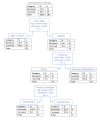Unscheduled Hospital Admission as a Prognostic Factor in the Oncologic Patient: A Retrospective Study
- PMID: 39569220
- PMCID: PMC11578073
- DOI: 10.7759/cureus.72029
Unscheduled Hospital Admission as a Prognostic Factor in the Oncologic Patient: A Retrospective Study
Abstract
Aims This research aimed to determine the correlation between survival, symptoms, and unscheduled admission in oncologic patients. Furthermore, this study aimed to develop a prognostic model that helps clinicians establish the indication of intervention by palliative care teams. Methodology A retrospective study of patients' digital clinical history registry was conducted to meet the two core objectives. The study population was patients with solid tumors undergoing unscheduled admissions to the oncology ward between January 1, 2018, and May 31, 2018. Demographic and clinical variables of those patients were analyzed. Specifically, the statistical analysis involved descriptive analysis, Kaplan-Meier curves, Log-Rank, and Chi-Squared Automatic Interaction Detection decision tree modeling. Results The results were obtained from 100 admissions of patients with an average age of 64. Of the patient cases examined, 67% (n = 67) were male. In 72% (n = 72) of the cases, patients presented with Stage IV tumors, and the most frequent primary tumor location among the admissions was lung, at 29% (n = 29). Intervention by the palliative care team occurred for 38% (n = 38) of patients. Mortality at 30, 90, 180, and 365 days was 34% (n = 34), 56% (n = 56), 71% (n = 71), and 78% (n = 78), respectively. Hepatic metastasis was the main predictor of mortality at 30 days (65%, n = 13) and at 90 days (90%, n = 18). In the absence of hepatic metastasis, the presence of more than one symptom predicted a mortality rate of 70% at 30 days. The main factor associated with mortality at 180 and 365 days was the tumor stage, with stage IV tumors having the highest mortality rate (84.7%, n = 61, and 90.3%, n = 65, respectively). Among the Stage IV population, the primary site shows a significant impact on survival, with colorectal/reproductive tumors being associated with decreased mortality. Conclusion Unscheduled admission is a negative prognostic factor in oncologic patients. An unscheduled admission can be expected to result in low survival in an oncologic patient, especially in those presenting with stage IV; involving non-colorectal/reproductive primaries; or presenting with pain, dyspnea, cachexia, or delirium.
Keywords: advancement in palliative care; cancer cachexia; cancer survival; emergency admission; oncological pain; palliative cancer; prognostic modeling; supportive and palliative care; survival analysis; unscheduled admission.
Copyright © 2024, Argerich et al.
Conflict of interest statement
Human subjects: Consent for treatment and open access publication was obtained or waived by all participants in this study. Institutional Ethics Committee, Hospital Universitario Arnau de Vilanova, Lleida issued approval CEIC-2354, dated October 29, 2020. Animal subjects: All authors have confirmed that this study did not involve animal subjects or tissue. Conflicts of interest: In compliance with the ICMJE uniform disclosure form, all authors declare the following: Payment/services info: All authors have declared that no financial support was received from any organization for the submitted work. Financial relationships: All authors have declared that they have no financial relationships at present or within the previous three years with any organizations that might have an interest in the submitted work. Other relationships: All authors have declared that there are no other relationships or activities that could appear to have influenced the submitted work.
Figures








References
-
- A systematic review of physicians' survival predictions in terminally ill cancer patients. Glare P, Virik K, Jones M, Hudson M, Eychmuller S, Simes J, Christakis N. https://www.bmj.com/content/327/7408/195. BMJ. 2003;327:195–198. - PMC - PubMed
-
- "Triggers" for early palliative care referral in patients with cancer: a review of urgent unplanned admissions and outcomes. Gemmell R, Yousaf N, Droney J. Support Care Cancer. 2020;28:3441–3449. - PubMed
-
- Unscheduled hospitalization in advanced cancer patients: time to rethink about the illness. Ostios-García L, Poma JM, Cabrero DS, Gutiérrez Sainz L, Villamayor Sánchez J, Alonso-Babarro A, Feliu Batlle J. J Clin Oncol. 2019;37
LinkOut - more resources
Full Text Sources
